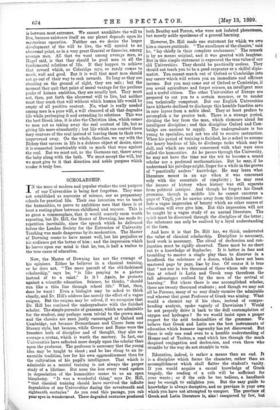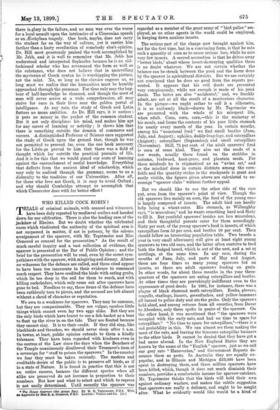SCHOLARSHIP.
IN the mass of modern and popular studies the real purpose of our Universities is being fast forgotten. They were not established as nurseries of science, nor as preparatory schools for practical life. Their one intention was to teach the humanities, to prove to ambitious men that there is at least a resting-place between childhood and success. This is so gross a commonplace, that it would scarcely seem worth repeating, but Dr. Hill, the Master of Downing, has made its repetition inevitable, since the speech which he delivered before the London Society for the Extension of University Teaching was made dangerous by its moderation. The Master of Downing seems to have meant well, but his prejudice or his audience got the better of him ; and the impression which he leaves upon our mind is that he, too, is half a traitor to the true cause of education.
Now, the Master of Downing has not the courage of his opinions. Either he believes in a classical training, or he does not. " The mere pursuit of the old-fashioned scholarship," says he, " is like praying to a picture instead of to a saint." Is it ? Again, he protests against a scientific education. Science, he thinks, " should run like a thin line through school life." What, then, does he want ? Even a biologist may be asked to think clearly, and Dr. Hill's address has merely the effect of a vague enigma. But the enigma may be solved, if we recognise that Dr. Hill has confused the undergraduate with the finished scholar. The simple pursuits of grammar, which are admirable for the student, may perhaps seem trivial to the grown man, and the classics are most justly encouraged at Oxford and Cambridge, not because Demosthenes and Cicero form our literary style, but because, while Greece and Rome were the founders both of discipline and of thought, they also en- courage a syntax, which is worth the mastery. In fact, our Universities have reflected more deeply upon the scholar than upon the professor. The professor is necessary that the young idea may be taught to shoot ; and he has clung to an in- exorable tradition, less for his own aggrandisement than for the cultivation of his pupil's intelligence. That which is admirable as a mental training is not always the proper study of a. lifetime. But none the less every word spoken in depreciation of the humanities seems to us an open blasphemy. " It was a wonderful thing," says Dr. Hill, " that classical training should have survived the infinite degradation of our Universities during the seventeenth and eighteenth centuries." As you read this passage, you rub your eyes in wonderment. These degraded centuries produced both Bentley and Pergola, who were not isolated phenomena, but merely noble specimens of a general learning.
However, Dr. Hill made one statement for which we owe him a sincere gratitude. " The excellence of the classics," said he, " lay chiefly in their complete uselessness." The remark is by no means original, and it was greeted with laughter. But in this simple statement is expressed the true value of our old Universities. They should be practically useless. They should net teach you to be a good carpenter or a skilful diplo- matist. You cannot march out of Oxford or Cambridge into any career which will return you an immediate and efficient income. But you may come out of Oxford or Cambridge, if you avoid agriculture and forget science, an intelligent man and a useful citizen. The other Universities of Europe are prepared to cut you to a certain measure, or to render you technically competent. But our English Universities have hitherto declined to discharge this humble function save in rare lapses from a noble ideal. They at least profess to accomplish a far greater task. There is a strange period, dividing the boy from the man, which clamours aloud for intelligent discipline ; and this discipline Oxford and Cam- bridge are anxious to supply. The undergraduate is too young to specialise, and not too old to receive instruction. When his period of training is finished, he is asked to assume the heavy burdens of life, to discharge tasks which may be dull, and which are rarely concerned with what were once called the humanities. As he passes through the University, he may not have the time nor the wit to become a sound scholar nor a profound mathematician. But he may, if he understand his privilege aright, linger for a while in the groves of " practically useless " knowledge. He may learn what literature meant in an age when it was concerned only with the essentials of simplicity ; he may read the lessons of history when history was still separate from political intrigue. And though he forgets his Greek grammar, though in middle life he cannot construe a page of Virgil, yet he carries away from this irrational inter- lude a vague impression of beauty which no other course of education will ever give him. But this impression will not be caught by a vague study of an unread literature. The spirit must be discerned through the discipline of the letter; the substance can only be realised by a loyal understanding of the form.
And here it is that Dr. Hill has, we think, underrated the value of classical scholarship. Discipline is necessary, hard work is necessary. The ritual of declension and con- jugation must be rigidly observed. There must be no short cut to a knowledge of Sophocles. It is better in fear and trembling to master a single play than to discover in a handbook the substance of a dozen, which have not been mastered page by page, line by line. Of course it is true that " not one in ten thousand of those whose sole occupa- tion at school is Latin and Greek reap therefrom the full advantages realised by the men of the revival of learning." But where there is one accomplished scholar, there are twenty thousand students ; and though we may not all be Porsons, many of us may dimly surmise the admirable end whereat that great Professor of Greek was aiming. What would a chemist say if his class, instead of compre- hending analysis, spoke vaguely of Darwinism 7 Would he not properly drive it back to the dull contemplation of oxygen and hydrogen 7 So we would insist upon a proper respect for the arid technicalities of the grammar. We believe that Greek and Latin are the best instruments of education which humane ingenuity has yet discovered. But there is only one road even to a humble understanding of Homer and of Tacitus, a road which lies through the much despised conjugation and declension, and even those who stumble by the way do not stumble in vain.
Education, indeed, is rather a means than an end. It is a discipline which forms the character, rather than an accomplishment which shall flatter the student's vanity. If you would acquire a casual knowledge of (reek tragedy, the reading of a crib will be sufficient for your wants ; or if the crib be too tedious, a handbook may be enough to enlighten you. But the easy guide to knowledge is always deceptive, and no province is your Own which you have not attempted to conquer. The province of Greek and Latin literature is, alas ! conquered by few, but there is glory in the failure, and no man was ever the worse for a loyal assault upon the intricacies of a Ciceronian speech or an Esehylean tragedy. One book, maybe, does not carry the student far on the way of culture, yet it carries him farther than a hasty recollection of somebody else's opinion. Dr. Hill most generously praised the work accomplished by Mr. Jebb, and it is well to remember that Mr. Jebb has understood and interpreted Sophocles because he is an old- fashioned scholar who has reverenced the form as well as the substance, who does not believe that in unravelling the mysteries of Greek syntax he is worshipping the picture, not the saint. No, so long as the classics engross us, so long must we realise that the humanities must be humbly approached through the grammar. For thus only may the bug- bear of half-knowledge be shunned, and though the most of men will never arrive at a wide comprehension, all may strive for once in their lives near the golden portal of intelligence. At any rate, the study of Greek and Latin flatters no mean ambition. As Dr. Hill says, it is useless ; it puts no money in the pocket of the common student. But. it not only disciplines his mind, and makes him apt for any career of learning or activity ; it shows him that there is semething outside the domain of commerce and success. A distinguished Professor of Science once supported the study of Greek upon the ground that, though he was not permitted to proceed far, even the one book necessary for the Little-go proved to him that there was a field of thought which lay outside the practical pursuits of life. And it is for this that we would guard our seats of learning against the encroachment of useful knowledge. Everything that deflects from the ancient ideal of scholarship, which may only be realised through the grammar, seems to us a disloyalty to the tradition of our Universities. After all, for those who love not Greek, it is easy to avoid Oxford ; and why should Cambridge attempt to accomplish that which Cirencester does with far better effect?







































 Previous page
Previous page